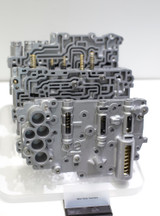Was Your Transmission Rebuild Dyno Tested?
Whether your transmission rebuild is working perfectly today, or it is already giving you problems, great thought has to be given to its dyno-testing because only a few companies go through the dyno-testing process.
Here's what we're getting at, it is essential to know if your transmission rebuild was dyno-tested for internal pressures and leaks, hydraulic, and system controls. The aim is to ensure it stands the test of time and does not break down when you least expect.
Re-manufacturers or transmission rebuild shops, for instance, will either give you a guarantee or assurance of a dyno test, but it is easy to confuse one with the other as an accurate measure of quality. While a guarantee says a cost-effective solution for your car needs was provided, a dyno test comes with a promise that the gearbox will not fail unexpectedly before reaching its full life expectancy.
This is because the transmission has been tested under operational conditions to ensure it has been built to work properly, reliably, and give you life expectancy. But more about that later!
What Is a Transmission Rebuild?
A transmission rebuild are those that have been dissembled entirely in a bid to replace its worn and damaged parts with new ones. The rebuilding process also involves the inspection of parts for possible wear occurring in the future. A transmission component that may be vulnerable is then replaced with a better part.
For this reason, a transmission rebuild offers the guarantee of quality, unlike a used transmission. They are also faster to find than a used transmission.
What Is Dyno Testing?
A dynamometer (dyno) testing is the use of specially-designed equipment to examine the state and operation of a transmission system if it meets factory pressure specifications at operating temperatures. The hours-long process is carried out by mounting a transmission on the dynamometer and applying a rotational force and other external forces on the transmission.
On the same note, if you're bent on knowing an engine's horsepower, then all it'll take is to connect it to a dyno. Here, the dyno places a load on the engine and then measures the amount of power produced by the engine against the load.
Minor repairs can also be carried out while the dyno is on the machine. Other checks that can be carried out include:
- Stall speed
- Converter lockup
- Transmission line pressure
- Shift point and response downshift
Components of a Dyno Machine
A transmission dyno machine consists of a powerful electric motor, pressure gauges, and mountings, internal combustion motor, as well as computerized operator panel and readouts. The pressure gauge, for instance, helps to monitor the pressure readings in the transmission.
Setup of this nature measures the force, the moment of force (torque), and pressure of the transmission, and it can be explicitly used on transmissions whose mountings and measurements are specific to a transmission drive.
Similarly, the test simulates a real operating environment by examining the gearbox's speed and gear changes, design speed range in each gear, among others.
Verification of a Transmission Dyno Testing
A dyno testing proves that the transmission's gearbox is operating according to factory specifications within its full design speed and gear range. The latter can be assured since the test measures the transmission's pressure, force, torque, temperature, and efficiency.
In the same vein, a technician carries out a post-operational check on the bolt torque and leaks. That being the case, a dyno test allows the transmission to undergo several operational conditions and measures the output of all each state.
Can Transmissions Fail a Dyno Test?
Most certainly, not all transmissions pass the dyno test due to several conditions. In a situation where the transmission does not perform under factory specifications, then it will not pass the dyno testing. When that happens, the transmission will be stripped down and rebuilt while it is in high gear in a bid to ensure it passes the dyno-test.
It is, however, not a bad thing that it failed the dyno-test since it informs that there is a need for an improvement which could see a more revamped transmission rebuild. That being the case, you can reap the full benefits of quality transmission rebuild, which is known to be reliable.
What If Your Transmission Is Your Business?
If you're a transmission rebuild shop or company in the remanufacturing industry, you'll agree that reputation matters, and it begins by giving your customers quality gearboxes. How else can you assure them that the transmission you've handed over to them won't fail in operating conditions?
It is through dyno testing that will check if the transmission will fail under these conditions. A dyno test will also check the transmission's quality thoroughly to ensure that it does not fail or potentially cause more damage to the engine.
Nonetheless, bypassing this step either to cut costs or time can negatively impact your reputation in the long run. And that could be bad for business given the return that will be made, the potential for a ruined reputation, and the extra work that will have to be put into the transmission rebuild.
How to Ensure a Quality Transmission Rebuilt?
A quality remanufactured gearbox designed by professionals is one that does not only come with a guarantee, but it has been dyno tested. If it passes the test, then it could even be better than a new transmission due to its high quality.
The Bottom Line
Now that you know why it is important for your transmission to be dyno tested, it can help you to determine if the faults prevalent in your vehicle emanated from the low-quality transmission.
In the same vein, you're aware at this point that not only is a guarantee necessary, but a dyno testing since it takes it one step further to assure you that the gearbox has been tested to meet factory guidelines.
When each of these is in place, you can have a high-quality transmission that can stand the test of time and the full functionality of other components it is paired with. For businesses, it will save your brand's name and help spread the word that a reliable remanufacturer is in town.




